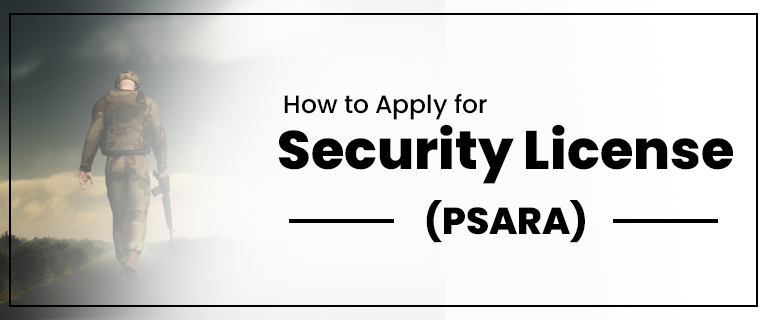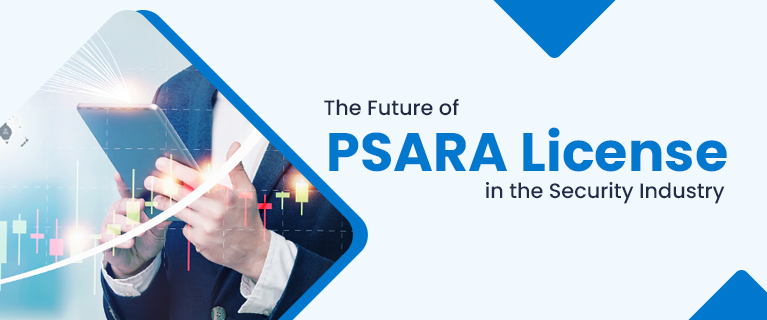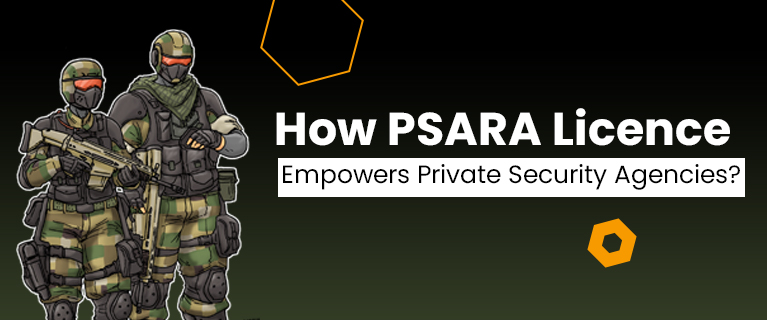How to Apply for Security License (PSARA)
In a world where safety and security are paramount concerns, security services play a vital role in safeguarding individuals, properties, and assets. If you are planning to start a security agency or work as a security guard in India, you must obtain a security license under the Private Security Agencies Regulation Act (PSARA). This license ensures that security services are provided by qualified and reliable individuals or agencies. In this blog, we will provide a comprehensive step-by-step guide on how to apply for a security license (PSARA) in India.
Understanding PSARA
The Private Security Agencies Regulation Act, 2005 (PSARA), is an essential piece of legislation in India that regulates the functioning of private security agencies. The primary objective of PSARA is to ensure the proper management and control of private security agencies and to maintain the quality of services provided by them. Under PSARA, every private security agency and individual security guard must obtain a security license from the respective state government to operate legally.
Eligibility Criteria for Obtaining a PSARA License
Before diving into the application process, it is essential to ensure that you meet the eligibility criteria set forth by the state government. Only a citizen of India is eligible for this license. The minimum age requirement for applying for a security license is usually 18 years or above.
The minimum educational qualification for security guards is typically 10th standard or equivalent. Applicants must undergo a thorough background verification process, which includes checking criminal records and previous employment history. Security guards must meet certain physical fitness standards as prescribed by the state government.Applicants must complete the required training as specified by the state government or PSARA.
Read also this -: How to Apply Online for a PSARA LicenseStep-by-Step Guide to Apply for a Security License (PSARA)
Step 1: Contact the State Controlling Authority (SCA)
The first step in the application process is to get in touch with the State Controlling Authority (SCA) responsible for regulating private security agencies in your state. You can visit their official website or office to gather information about the application procedure, required documents, fees, and other relevant details.
Step 2: Complete the Application Form
Obtain the application form for a security license (PSARA) from the SCA or download it from their official website. Fill in all of the essential information and attach all the necessary documents as mentioned on the application form.
Step 3: Documents Required
The documents required for the security license application may include:
- Identity proof (Aadhar card, voter ID, or passport)
- Address proof (electricity bill, rent agreement, or voter ID)
- Educational qualification certificates
- Birth certificate or age proof
- Passport-size photographs
- Character certificate
- Experience certificates (if applicable)
- NOC from the owner of the premises (for agencies operating from rented premises)
- Memorandum of Association (for private security agencies)
Step 4: Background Verification
Undergo the background verification process conducted by the police or any agency designated by the state government. This process includes checking your criminal record and verifying your character.
Step 5: Training Requirements
Complete the mandatory training as prescribed by the state government or PSARA. This training is crucial as it imparts the necessary skills and knowledge required to perform security duties effectively.
Step 6: Fees and Payments
Pay the applicable fees for the security license as specified by the state government. The fees may vary based on the type of license (individual guard or agency) and the duration of the license.
Step 7: Submission of Application
Submit the completed application form along with all the required documents and proof of fee payment to the State Controlling Authority (SCA) as per their guidelines.
Step 8: Processing and Approval
The SCA will review your application and conduct necessary inspections of the premises (in case of private security agencies). If everything is in order, the SCA will issue the security license to you or your agency.
Step 9: Validity and Renewal
The security license (PSARA) is usually valid for a specific period, such as one year or three years. Ensure that you renew the license before its expiry to continue operating legally.
Read also this -: Benefits of Acquiring a PSARA LicenseConclusion
Obtaining a security license (PSARA) is a crucial step for individuals and agencies looking to provide security services in India. The licensing process involves fulfilling eligibility criteria, completing background verification, and undergoing mandatory training. A valid security license not only ensures legal authorization but also enhances credibility and trust among clients and employers.
Aspiring security guards and entrepreneurs planning to start a security agency should diligently follow the step-by-step guide mentioned in this blog. By complying with the regulatory requirements and maintaining the necessary qualifications, they can operate legally, provide quality security services, and contribute to a safer and more secure society. Remember to check specific requirements and guidelines set by the State Controlling Authority (SCA) in your state to streamline the application process and ensure a successful outcome.




Comments
Post a Comment